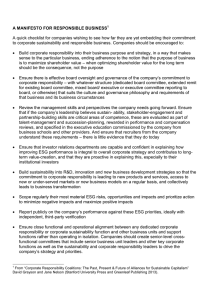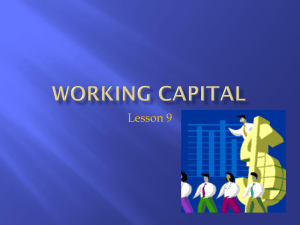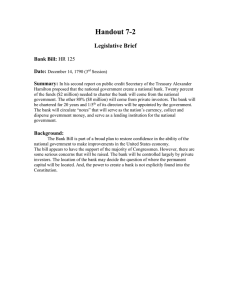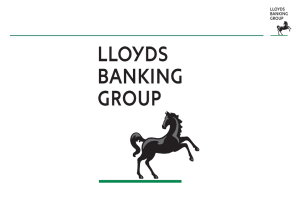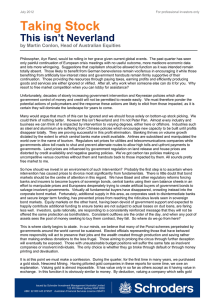Can investors do well while also doing good?
advertisement
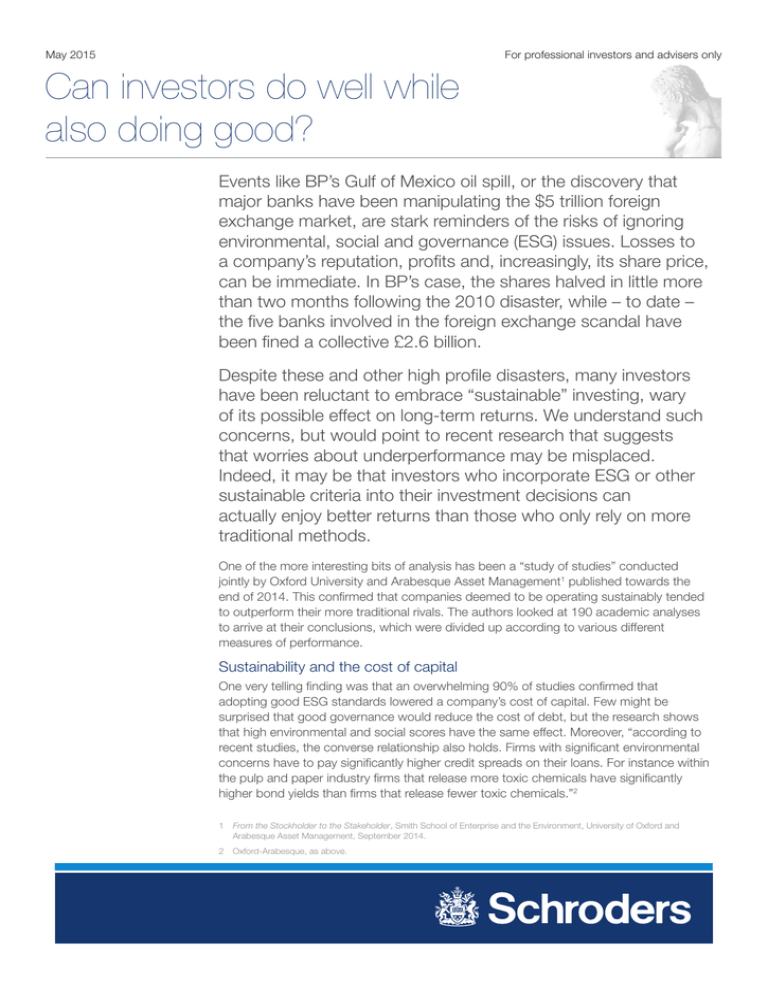
May 2015 For professional investors and advisers only Can investors do well while also doing good? Events like BP’s Gulf of Mexico oil spill, or the discovery that major banks have been manipulating the $5 trillion foreign exchange market, are stark reminders of the risks of ignoring environmental, social and governance (ESG) issues. Losses to a company’s reputation, profits and, increasingly, its share price, can be immediate. In BP’s case, the shares halved in little more than two months following the 2010 disaster, while – to date – the five banks involved in the foreign exchange scandal have been fined a collective £2.6 billion. Despite these and other high profile disasters, many investors have been reluctant to embrace “sustainable” investing, wary of its possible effect on long-term returns. We understand such concerns, but would point to recent research that suggests that worries about underperformance may be misplaced. Indeed, it may be that investors who incorporate ESG or other sustainable criteria into their investment decisions can actually enjoy better returns than those who only rely on more traditional methods. One of the more interesting bits of analysis has been a “study of studies” conducted jointly by Oxford University and Arabesque Asset Management1 published towards the end of 2014. This confirmed that companies deemed to be operating sustainably tended to outperform their more traditional rivals. The authors looked at 190 academic analyses to arrive at their conclusions, which were divided up according to various different measures of performance. Sustainability and the cost of capital One very telling finding was that an overwhelming 90% of studies confirmed that adopting good ESG standards lowered a company’s cost of capital. Few might be surprised that good governance would reduce the cost of debt, but the research shows that high environmental and social scores have the same effect. Moreover, “according to recent studies, the converse relationship also holds. Firms with significant environmental concerns have to pay significantly higher credit spreads on their loans. For instance within the pulp and paper industry firms that release more toxic chemicals have significantly higher bond yields than firms that release fewer toxic chemicals.”2 1 F rom the Stockholder to the Stakeholder, Smith School of Enterprise and the Environment, University of Oxford and Arabesque Asset Management, September 2014. 2 Oxford-Arabesque, as above. Can investors do well while also doing good? 2 This is confirmed by rating agencies, which tend to give better ratings to issuers with good ESG policies. And, of course, more than four years on from the BP disaster, the 10-year credit spread on the oil company’s debt (as measured by credit default swaps) is, at more than 100 basis points, still about double the level at which it stood before the incident. It’s a similar story with respect to equity cost. According to one analysis3, well-governed firms enjoyed an equity cost advantage of anywhere between 0.8% and 1.3%. Another found a reduction of 1.8% in the cost of equity for firms with “good” corporate social responsibility and which were reporting their policies for the first time. Sustainability and operational performance This divergence between firms with strong and weak implementation of ESG policies was carried over into internal measures: 88% of the studies reviewed concluded that there was a positive correlation between sustainable companies and operational performance. It is perhaps not so surprising to find that evidence confirms the role of good governance – reflected in areas like small boards and well-designed executive pay schemes – in higher company performance. More interesting, though, was the finding that: “Proper corporate environmental policies result in better operational performance. In particular, higher corporate environmental ratings, the reduction of pollution levels, and the implementation of waste prevention measures, all have a positive effect on corporate performance.”4 We at Schroders are trying to put this theory into practice through our membership of the Carbon Action Initiative (see box). Carbon Action Initiative – a Schroders case study We have been involved in the Carbon Action Initiative with 13 other asset managers since 2010. This is a plan spearheaded by the Carbon Disclosure Project (CDP), an investor-led charity, that aims to encourage companies to reduce carbon emissions and increase energy efficiency. The rationale is simple. Recent CDP research has shown that carbon reduction activities generate positive returns, delivering an average return on investment of 33% and a payback in three years. The CDP figures show that convincing management to implement energy efficiency initiatives has the biggest impact on emissions reduction. Moreover, high-emitting companies that set absolute reduction targets achieve emission cuts that are double the rate of those without targets, with firm-wide profitability 10% higher. The leaders in carbon disclosure see a return on equity (ROE) that is 18% more than laggards, while generating 67% higher ROE than companies with no disclosure policies at all. As part of our involvement in this initiative, Schroders is having conversations with four companies: Sime Darby, Santos, Newcrest Mining and PetroChina. Over the past two years, we have engaged with these companies to encourage them to adopt a more strategic approach to climate change. Three out of the four have responded in varying degrees: Sime Darby: This conglomerate has publicly committed itself to a 40% reduction in emissions per tonne of production at its plantation division. It will consider absolute targets once it has assessed progress on its current carbon management plan. Santos: Although there has not been much progress in this oil and gas group’s approach to carbon emissions, it is nonetheless encouraging that it is ready to consider longer-term targets for both energy efficiency and emissions savings. Newcrest Mining: Management of this gold and copper miner has to date focused its energy efficiency improvements on cost control. We are now encouraging it to take the natural next step of setting a carbon emissions target. We are continuing our efforts to engage with oil producer PetroChina on carbon issues, but have yet to make progress. 3 C orporate Governance and the Cost of Equity Capital, Hollis Ashbaugh, Ryan LaFond, both University of Wisconsin, and Daniel W. Collins, University of Iowa, October 2004. 4 Oxford-Arabesque, as above. 3 Can investors do well while also doing good? Sustainability and share prices Arguably, the most important test of responsible corporate policies for investors is whether they lead to superior share price performances. Again, as might be expected, better governance standards do appear to equate to better stockmarket performance. As far back as 2003, US academic research showed this healthy outperformance in practice5. The researchers found that a portfolio which went long on firms with “more adequate” shareholder rights and went short of those with “less adequate” rights produced annual outperformance of 8.5% between 1990–1999. The analysis included whether or not antitakeover measures were in place, something which is likely to have had an obvious impact on the share price. Less obvious is the impact that good employee relations can have on stock market results. More sustainability leads to better returns – but only over the long term Researchers from the Harvard Business School wanted to look at the impact of sustainability since its first serious adoption. Using 1994 as a starting date, they identified 90 non-financial firms that have been following a substantial number of environmental and social policies since then. These they called “high-sustainability” companies. To provide a benchmark, they picked another 90 comparable firms that adopted few of these policies, labelling this group “low-sustainability” companies. Together, these two groups provided a database from 1993 to 2010 to evaluate what effect, if any, sustainability has had on the performance of companies. To measure operational or “accounting” performance, the researchers assessed, among other things, return on equity (net profits divided by shareholders’ equity). On this basis, $1 invested in a value-weighted, high-sustainability portfolio would have grown to $31.70 by 2010, or 23% more than the value of a value-weighted low-sustainability portfolio. The even better news for shareholders is that these hefty differences in operational returns also fed through to stockmarket results. The Harvard researchers calculated that the same $1 invested in the shares of the high-sustainability companies in 1993 (weighted by value) would have become a healthy $22.60 by the end of 2010, some 47% more than $1 invested in a value-weighted portfolio of low-sustainability companies. The researchers noted that society’s concerns about sustainability have grown from next to nothing in the early 1990s to being “a dominant theme today”. They added that high-sustainability companies dramatically outperformed their lowsustainability brethren over the 18 years studied. “However, the results suggest that this outperformance occurs only in the long term. Managers and investors that are hoping to gain a competitive advantage in the short term are unlikely to succeed by embedding sustainability in the organisation’s strategy.” A dollar can grow much bigger if it’s invested in a company with ESG in mind Dollars 25.00 20.00 15.00 10.00 5.00 0.00 1992 1994 1996 1998 2000 High-sustainability portfolio 2002 2004 2006 Low-sustainability portfolio 2008 2010 Source: S&P Indices Versus Funds (SPIVA) Mid-Year 2014, and Schroders, as at 30 June 2014. 5 “Corporate Governance and Equity Prices”, Paul A. Gompers, Harvard Business School, Joy L. Ishii, Stanford Graduate School of Business, and Andrew Metrick, Yale School of Management, Quarterly Journal of Economics, vol. 118, no. 1, February 2003. Can investors do well while also doing good? 4 Another Wharton study investigated the “100 Best Companies to Work For” as a reflection of employee satisfaction6. It discovered that such companies generated a return of between 2.3% and 3.8% a year above industry benchmarks in the period 1984 to 2011. This provides tangible evidence of the growing importance of “human capital” to companies. It suggests that keeping employees happy should be more than just a philanthropic gesture on the part of management. More widely, when other sustainability factors – ranging from policies on employees and product responsibility to the environment and human rights – were factored in, a Harvard analysis7 similarly found significant outperformance, at least amongst non-financial companies (see box, previous page). In all, four-fifths of the studies looked at in the Oxford-Arabesque review suggested that share prices were enhanced for companies with good sustainability practices. The authors conclude that, given the strength of the scientific evidence: “It is in the best interest of institutional investors and trustees, in order to fulfil their fiduciary duties, to require the inclusion of sustainability parameters into the overall investment process.” Logically, this duty also extends to those acting on their behalf: “It is in the best interest of asset management companies to integrate sustainability parameters into the investment process to deliver competitive risk-adjusted performance over the medium to longer term and to fulfil their fiduciary duty towards their investors.”8 The authors suggest that, on current trends, the use of sustainability factors in the investment process will become the norm in years to come. This trend is likely to gain added impetus from European Union initiatives. Successful investors are therefore likely to institute continuous research into what are the right sustainability factors to be considered. “In such a scenario, we expect that it will be a requirement for professional investors to have a credible active ownership strategy that goes beyond the traditional instruments that institutions investors currently employ.”9 Conclusions No study – or even study of studies – can be conclusive. Nonetheless, we believe recent research adds substantial weight to the argument that incorporating ESG considerations into investment decisions does no harm to returns, and may even improve them. This makes the decision over whether or not to include ESG increasingly finely balanced, to say the least. If performance is no longer an issue, and if sustainable investing can help improve the world in non-financial ways, then why not? On the other hand, if ESG can genuinely add to the financial performance of investments, institutional investors with a fiduciary duty to their clients may have to place this issue much higher up the agenda. Whatever the case, while no professional will claim that they can avoid disasters like BP’s, it is becoming increasingly clear that investing with ESG issues in mind doesn’t have to be a drag on performance. Indeed, it may even create outperformance that is not available from any other source. Jessica Ground, Global Head of Stewardship 6 “The 100 Best Companies to Work for in America”, Robert Levering, Milton Moskowitz and Michael Katz, Addison-Wesley, 1984, and “Does the stock market fully value intangibles? Employee satisfaction and equity prices”, Alex Edmans, Wharton School, University of Pennsylvania, Journal of Financial Economics, vol. 101, issue 3, September 2011. 7 “The Impact of a Corporate Culture of Sustainability on Corporate Behavior and Performance”, Robert G. Eccles, Ioannis Ioannou and George Serafeim, Harvard Business School working paper, 4 November 2011. 8 Oxford-Arabesque, as above. 9 Oxford-Arabesque, as above. Can investors do well while also doing good? 5 Important information: The views and opinions contained herein are those of the authors, and may not necessarily represent views expressed or reflected in other Schroders communications, strategies or funds. This document is intended to be for information purposes only and it is not intended as promotional material in any respect. The material is not intended as an offer or solicitation for the purchase or sale of any financial instrument. The material is not intended to provide, and should not be relied on for, accounting, legal or tax advice, or investment recommendations. Information herein is believed to be reliable but Schroders does not warrant its completeness or accuracy. No responsibility can be accepted for errors of fact or opinion. Reliance should not be placed on the views and information in the document when taking individual investment and/or strategic decisions. Past performance is not a reliable indicator of future results, prices of shares and the income from them may fall as well as rise and investors may not get back the amount originally invested. UK Investors: The data contained in this document has been obtained from sources we consider to be reliable. No responsibility can be accepted for errors of fact and the data should be independently verified before further publication or use. This does not exclude or restrict any duty or liability that Schroders has to its customers under the Financial Services and Markets Act 2000 (as amended from time to time) or any other regulatory system. The sectors shown are for illustrative purposes only and not to be considered a recommendation to buy or sell. Exchange rate changes may cause the value of any overseas investments to rise or fall. Issued by Schroder Investment Management Limited, 31 Gresham Street, London EC2V 7QA. Registration number 1893220. Authorised and regulated by the Financial Conduct Authority. For your security, communications may be taped or monitored. w47074
